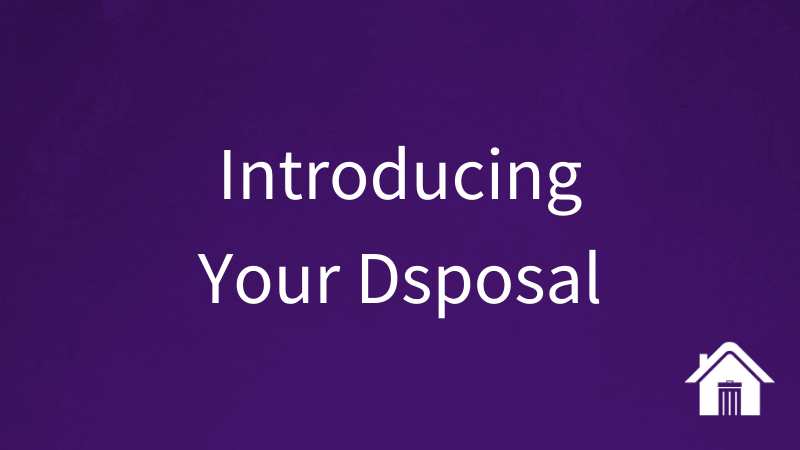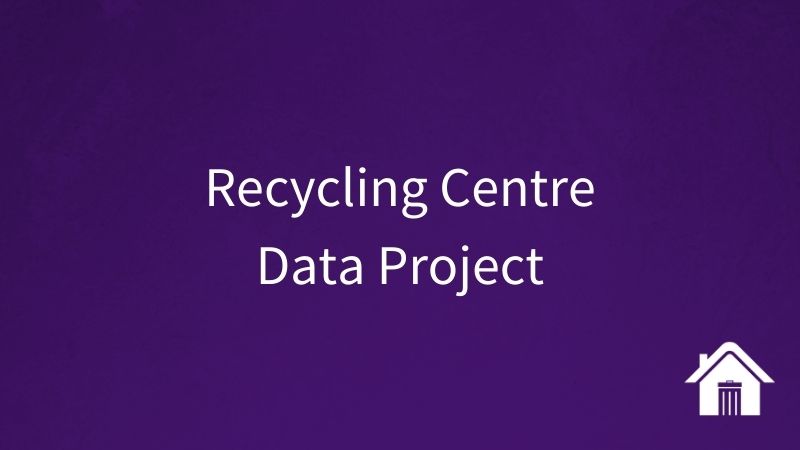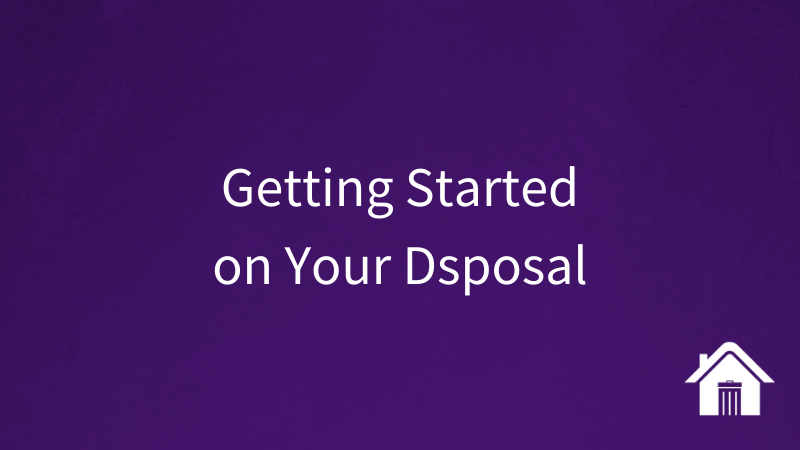
Open Data Standard for Household Waste Recycling Centres (HWRCs)
On this page you can:
- Read our final report
- Read our Guiding Principles
- Find links to our GitHub where the open data standard and open dataset are currently published
- See our Roadmap for the future
Report: Creating Open Data Infrastructure to Turn Rubbish into Resources
About
This report was produced as part of a project funded by the Open Data Institute (ODI). We were one of seven organisations awarded funding from The Open Data Institute Stimulus Fund via their Innovate UK funded R&D programme. The Stimulus Fund aimed to explore approaches that enable trustworthy and ethical sharing of data to help citizens and businesses lower their impact on the environment, improve public services, and save lives.
This report has been researched and produced by Your Dsposal and Open Data Manchester, and published in March 2021. Its lead authors were Sophie Walker, Tom Passmore and Jamie Whyte. It builds on work carried out by Dsposal and Open Data Manchester as part of the Defra GovTech Catalyst Smart Waste Tracking project Phase I in 2018 and 2019. The views in this report are those of the authors.
If you want to share feedback by email or would like to get in touch, contact Sophie Walker at [email protected].
Executive Summary
Open data creates opportunities to turn rubbish into resources
This report is the result of work carried out over 8 months including desk research, an initial series of six stakeholder workshops in August and September 2020, a further set of three workshops in January 2021 and technical work to develop an open data standard on Household Waste Recycling Centres (HWRCs).
This report provides details of how we approached developing this open data standard with stakeholders which we hope is of use to others looking to develop open data standards. We also cover our key learnings and our plans for the next stages of this standard and dataset.
The authors are strong advocates of the need for open data standards for the waste industry and this project builds on previous work to develop a prototype open data standard for waste movements.
The waste industry is waking up to how useful and valuable data can be, but as a sector is still digitally immature and lacking in open data infrastructure to truly realise the potential of waste data. We hope this can be an important first step in establishing an open data institution that can develop the necessary assets to enable waste data to become the valuable resource it should be. Better waste data can lead to improved resource efficiency which in turn can help reduce our impact on the environment and meet our carbon budgets.
We acknowledge that there is much interesting work being undertaken around the world to actively address the challenges of the climate emergency and specifically on improving and opening up environmental data. These are complex, systemic challenges and will not be solved with a single initiative or by any individual actor. It is vital that we find ways to better enable collaboration. Open data and open data standards, while by no means a panacea, provide a foundation on which to build upon.
Furthermore, the opportunities and innovation that can be unlocked through the development of this open data infrastructure should not be underestimated. Global technology institutions including Open Street Map (OSM), Wikidata and Microsoft have already expressed interest in using this data to provide services to the public, and initiatives like Open Banking provide ample examples of how open data can spur innovation and create new products and services.
Open Data Standard for HWRCs – Guiding Principles
These have been the principles that have guided the development of the open data standard for HWRCs. As we move into this next phase and establish a sustainable and appropriate governance structure these principles will be reviewed and amended as necessary.
Be Open
- We work as openly as possible – this means publishing blogs and reports, communicating with stakeholders regularly, being candid about what worked and what didn’t and sharing lessons learned, findings and outputs.
- Open data standards should be developed in the open – we invite and encourage participation from all interested parties so that the standard reflects reality for as many people and organisations as possible.
- We publish the data openly, publish the standard openly and publish our ways of working openly.
Resource Efficiency
- We use resources like time and funds wisely and don’t squander other people’s time.
- We seek to develop data infrastructure that saves others time and money.
- We aim to develop data infrastructure that helps move us towards a more resource efficient circular economy.
Maximise Utility
- We endeavour to make data infrastructure that is useful, ideally in multiple ways.
- We make use of other existing open data infrastructure – this saves our resources and supports other open data initiatives.
- We ensure the open standard and dataset are usable and accessible.
Collaborate Widely
- We seek and support collaboration across sectors and industries because we all create waste and the waste ecosystem touches every one of us.
- We acknowledge we don’t know what we don’t know so we encourage engagement from as many people and organisations as possible to test assumptions, challenge our thinking and build strong networks.
Evolve and Adapt
- We will continue to learn and evolve so that the standard and dataset remain relevant and useful. If they are no longer of use, we’ll retire them.
- We acknowledge this isn’t something that is finished, we will respond to the needs of the industry and the ecosystem to adapt.
Open Data Standard for HWRCs
The open data standard can be found on GitHub
Open Dataset of HWRC Information
The open dataset can be found on GitHub
The Roadmap
It was clear from the stakeholder workshops we carried out that there are a number of directions that the standard can develop in and we know that there was disappointment from some attendees that their areas of interest and priority haven’t been addressed in this first version of the standard. We understand that this is the first stage in what we hope will be a far-reaching and wide-ranging development that grows and adapts to meet the needs of the ecosystem.
We have outlined some short- and medium-term actions to support the launch of the standard and aid its adoption, with longer-term ideas detailed below.
Short-Term
- Data hack event to further develop open dataset (weekend of 20 and 21 March 2021)
- Develop a comms and marketing strategy for the launch
- Launch of the standard and dataset
- Support local authorities to adopt
Medium-Term
- Develop governance mechanism and recruit board
- Continue to build network of collaborators and stakeholders
- Look for further funding opportunities to develop additional areas identified on Road Map
- Explore potential business models for ensuring financial sustainability
- Review, iterate and improve
Longer-Term
Below are the areas we’ve outlined so far for further work; these reflect the range of stakeholders who took part in the workshops and there are likely other directions to be travelled in as well. They are not listed in order of priority and we will work with stakeholders to determine which areas we should focus on. We welcome collaboration with others who may wish to support this work.
Facilitate and encourage reuse
Encouraging reuse was a strong theme in a couple of the workshops and something that could be very beneficial to a number of stakeholders, especially the public and local authorities, as well as helping minimise environmental impact. Research into user journeys to understand when and how they could be helped to divert goods away from ‘the tip’ is needed alongside better understanding what data would be needed to enable this.
Granular data on services offered or waste streams accepted
It was clear that more granular data on waste streams would be hugely beneficial to enable understanding of the material types being collected at HWRCs – for example going beyond ‘bulky waste’ to ‘sofa’ and then even beyond that to ‘wood, foam, textiles’ – but this was beyond the scope of this project. We have ensured the standard can accommodate the addition of more granular data.
Addition of further details on HWRC operations or sites
Due to the variety of possibilities we weren’t able to include details in the standard around Covid safe procedures or details about the array of permitting systems local authorities may use. Adding useful information like this to the standard would be valuable and a source of much needed information but it requires further research to ensure it can be fit for purpose.
Additional data for wider applications
A theme that came up a couple of times was around adding in data fields that may not be of use to the waste ecosystem or the public looking for waste information, but could add value to the wider data ecosystem. Including information such as the area (i.e. m2) of the sites would be useful to planners alongside potentially linking to other data sources around population size served, or traffic counters. Further research to understand where the value would lie for these wider stakeholders would be required alongside research into what datasets already exist and could be linked to.
Widening the standard to include other recycling sites
Though this project focussed on household waste recycling centres a question that was brought up a number of times was if the standard could be broadened to include sites such as bring banks (such as the bottle banks you find in supermarket car parks) or in-store take back schemes (like battery bins in supermarkets or retailer-led collections). This would be relatively easy to accommodate in the standard but the potential complication comes from their more transient nature and who would hold responsibility to keep this data up-to-date. Further research to engage with retailers and other relevant stakeholders is necessary before this work could be done. There could be a lot of value for the public to have a definitive source of information about all recycling options.
Widening the standard to include all licensed or permitted waste sites
It would be a fairly small piece of work to research if the standard could easily accommodate all licensed or permitted waste sites and could be of value to the industry especially with the expected roll out of mandatory electronic waste tracking.
Site specific data on operations
This covers an array of different points but was a theme that came up at a number of workshops. There was a desire for more standardised information to answer questions like:
- Where does the waste go when it leaves the site?
- What are the recycling rates for a particular waste stream?
- Is the site well managed? Does it meet KPIs?
- What are the contamination rates?
- Are the materials recycled in the UK?
- What is the carbon impact of a particular site?
- Who handles complaints and is there a record of all complaints?
- Is there a benchmark that I can measure my local site against?
The data required to answer many of these questions is complex and well beyond the scope of this project, but the fact there was such an appetite from a broad range of stakeholders for this data and a clear argument that openly available data that could answer these questions could lead to increasing the standards across the industry and improve public trust in the system makes this a difficult but worthwhile area to explore.


